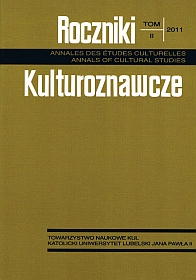Mythical Diomedes and Biblical Jacob. The Motif of “a Human Being’s Struggle with Deity” in Hellenic Culture and in Biblical Texts
Abstract
Analysing the rich treasury of literary works from the different cultural areas one can point out that in these opuses there are sometimes various kinds of motifs, which are characterized by a certain similarity or contain in themselves some common elements. This phenomenon becomes all the more interesting when some motif, which shows parallelism, originates from two distinct cultures – in many cases independent of themselves.
An example of this can be the motif of “a human being’s struggle with deity”, which occurs – inter alia – in the fifth book of Homer’s Iliad and in 32nd chapter of Genesis. In the first case the man struggling with deity is Diomedes, who in battle with the Trojans wounded first Aphrodite then attacked Apollo and subsequently in direct struggle wounded Ares. In the biblical narrative there is a description of an all-night struggle with Jacob and a mysterious “someone”, which is identified either directly with God Himself or with a person of “angel of the Lord”.
The analysis of Iliad’s and Genesis’s texts allows to notice that – in despite of similarities – presented motifs differ in details. It causes, that each of them possess their own specific differences. On the grounds of the presented study one can be postulated that essential quality, which distinguishes both descriptions containing the motif of “a human being’s struggle with deity”, is the spiritual nature given to Jacob’s struggle. It – on the contrary to Diomedes’s case – is expressed by the interior transformation of patriarch Jacob and by the obtainment of blessing from God at the end of the struggle. Therefore the description of Jacob’s struggle with God possesses a much more deep message.
References
Bartoszek A., Znaczenie imienia na starożytnym Bliskim Wschodzie, „Communio” 14 (1994), nr 1, s. 15-24;
Biblia i jej kultura. Stary Testament, red. M. Quesnel-Ph. Gruson, red. wyd. pol. J Warzecha-F. Mickiewicz, Ząbki: Apostolicum, 2008;
Clifford R.J.- Murphy R.E., Księga Rodzaju, w: Katolicki Komentarz Biblijny, red. wyd. oryg. R.E. Brown-J.A. Fitzmyer-R.E. Murphy, red. wyd. pol. W. Chrostowski, Warszawa: Oficyna Wydawnicza „Vocatio”, 2001, s. 11-71;
Cohen S., Penuel, w: The Interpreter’s Dictionary of the Bible, vol. 3, ed. G.A. Buttrick etc., New York: Abingdon Press, 1962, s. 727;
Driver S.R., Jacob, w: A Dictionary of Bible, vol. 2, ed. J. Hastings, J.A. Selbie, Edinburgh-New York: T.&T. Clark-Charles Scribner’s Sons, 1928, s. 526-535;
Drozd J., Księga Ozeasza. Wstęp-przekład-komentarz-ekskurys, w: Księgi proroków mniejszych: Ozeasza-Joela-Amosa-Abdiasza-Jonasza-Micheasza. Wstęp-przekład z oryginału-komentarz, red. S. Łach, Poznań: Pallottinum, 1968, s. 29-109;
Frazer J.L., Le folclore dans l’AT, Paris 1924;
Graves R., Mity greckie (Meandry kultury), przekł. H. Krzeczkowski, Kraków: Vis-à-vis „Etiuda”, 2009;
Griffin J., Homer, przeł. R.A. Sucharski, Warszawa: Prószyński i S-ka, 1999;
Hamilton V.P., The Book of Genesis. Chapter 18-50 (NICOT), Grand Rapids: Eerdmans, 1990;
Hymn do Apollona 1-4, w: Hymny Homeryckie, przekł., wstęp, oprac. W. Appel, Toruń: Algo, 2001;
Kumaniecki K.-Mańkowski J., Homer, Warszawa: Wydawnictwo Szkolne i Pedagogiczne, 1974;
Lemański J., Pięcioksiąg dzisiaj, Kielce: ITB „Verbum”, 2002;
Literatura Grecji Starożytnej. T. 1. Epika – Liryka – Dramat (ŹM 225), red. H. Podbielski, Lublin: TN KUL, 2005;
Łach S., Księga Rodzaju. Wstęp – przekład z oryginału – komentarz (PŚST I/1), Poznań: Pallottinum, 1962;
McCarthy D.J.-Murphy R.E., Księga Ozeasza, w: Katolicki Komentarz Biblijny, red. wyd. oryg. R.E. Brown-J.A. Fitzmyer-R.E. Murphy, red. wyd. pol. W. Chrostowski, Warszawa: Oficyna Wydawnicza „Vocatio”, 2001, s. 799-815;
Parrot, A., Biblia i świat starożytny, przeł. E. Zwolski, Warszawa: Instytut Wydawniczy „Pax”, 1968;
Pezzani. D., Jakub i Anioł. Tajemnica wzajemnych relacji, Kielce: Jedność, 2004;
Poniży B., Księga Mądrości. Od egzegezy do teologii (Biblioteka Pomocy naukowych 17), Poznań: Wydawnictwo UAM, 2000;
Sabourin L., La lute de Jakob avec Élohim (Gen.32,23-33), EC 10(1958), s. 78-89;
Speiser E.A., Genesis. Introduction, Translation, and Notes (AB1), Garden City-New York: Doubleday& Company, Inc., 1964;
Synowiec J.S., Pięcioksiąg. Wprowadzenie do Ksiąg: Rodzaju, Wyjścia, Kapłańskiej, Liczb i Potworzonego Prawa, Kraków: Wyd. oo. Franciszkanów „Bratni Zew”, 2000;
Vaux R. de, Instytucje Starego Testamentu, t. 1-2, przeł. T. Brzegowy, Poznań: Pallottinum, 2004;
Westermann C., Genesis 11-36 (BKAT I/2), Neukirchen-Vluyn: Neukirchener Verlage, 1981;
Winston D., The Wisdom of Salomon. A New Translation with Introduction and Commentary (AB 43), Garden City-New York: Doubleday&Company, Inc., 1979;





